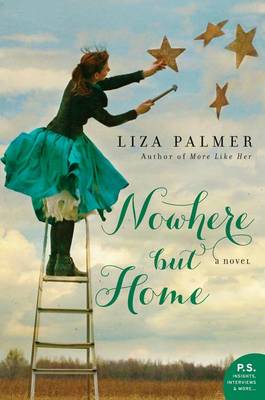Reviewed by girlinthepages on
I finished this book in less than 24 hours because it does NOT disappoint. I was so, so engaged in all of the elements of the story. Queenie, the main character (unfortunately, or fortunately depending on your POV, named Queen Elizabeth Wake) is a failing, vagabond chef who can’t keep down a job. After losing yet another gig, she’s finds her way back home to her extremely small hometown in Texas, which she generally avoids as all costs. She takes a rather unusual and morbid job while there as the chef cooking last meals for death row inmates at the local prison, which gives her perspective and takes her mind off of the small town drama and stigmas that plague her and her family.
While the premise of the book sounds rather morbid, it’s actually a really eye opening read in multiple ways. Queenie comes from the ultimate dysfunctional family (her mother had a really horrendous reputation that’s stuck with Queenie and her sister long past her mother’s death) that has led to a seemingly unshakeable stigma in her small Texas town. Yet her sister, Merry Carole, has managed to open her own small business and raise a respectful and talented son as a single mother. While both sisters are still susceptible to the hurt of small-town gossip, it’s really empowering to read how they take strides to break the emotionally abusive and neglectful family patterns that they grew up with, and to watch them challenge themselves and each other emotionally as they seek to rise above the town’s view of them. (Also, a quick note, when I read the synopsis I though the story would focus heavily on romance. While it was there, it largely took a backseat to all of the personal development and family growth that Queenie experienced, and for that as a reader I was grateful).
The description of the small town of North Star was perhaps one of the best I’ve read. Liza Palmer’s writing was so intricately detailed to show the nuances of the tiny community, from the too-close-for-comfort relationships to the blinding power of ignorance and denial that can last for decades. Yet the constant pettiness didn’t overwhelm every aspect of the novel, and there are moments where the simplicity of living a small town life are made to seem to fulfilling and rewarding, such as the neighbors who run restaurants with amazing home cooking out of their backyards to the warm summer nights of family barbecues. Palmer did an excellent job juxtaposing the repulsion and pull that Queenie feels toward North Star, and the novel ends in a sort of peaceful place that places no shame in returning to where you started from and still being the best, and most changed, possible version of yourself. I’ve never been to Texas, but after reading about North Star I feel as though I’ve lived and breathed it, if for only a short amount of time.
Of course, the most intriguing lot element of the book is Queenie’s job cooking last meals for death row inmates. An emotionally charged plot line, it was so interesting to see what these fictional prisoners requested, and how each menu request impacted Queenie, and what she was able to glean from their personality and humanity (or lack thereof) by what they ordered. Food as a vehicle for healing and soothing is a huge theme in this story, and watching Queenie cook, whether in the charged atmosphere of the prison kitchen or in her sister’s comfortable and cozy home, was cathartic as it clearly helped Queenie to find herself through food again. It also didn’t hurt that the food descriptions were mouth watering-delicious, and this is coming from someone who is not usually the biggest fan of Southern food.
Overall: I loved this book for the food, for the family, and for the idea that it’s never too late to find yourself. Patterns can be changed and relationships can heal, and it’s the quiet, small type of hope that runs throughout the course of this novel that makes it so sweet and satisfying. I walked away from this novel with a sense of peace for the characters and a pride in their accomplishments, and my only complaint is that I wanted MORE. Hooray for my first 5 star read of 2017!
Reading updates
- Started reading
- 8 January, 2017: Finished reading
- 8 January, 2017: Reviewed
